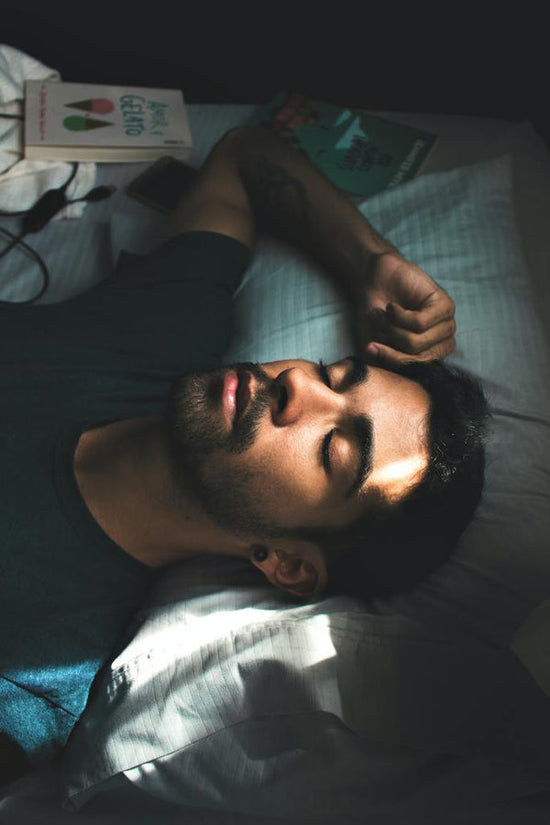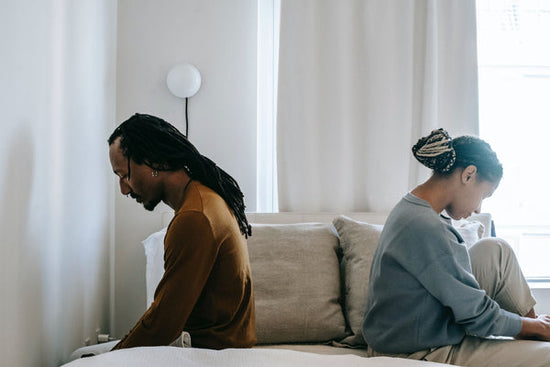
Say "Hello" To Sleep
Are you tired of tossing and turning all night, only to wake up feeling more tired than when you went to bed? Don't let poor sleep quality ruin your day (and your looks)! With our expert team's help, you can finally get the restful and rejuvenating sleep you deserve. We've rounded up the most pressing questions on quality sleep from our readers and answered them in this comprehensive guide. Whether you're struggling with snoring, insomnia, or simply want to improve your sleep hygiene, we've got the latest tips and tools to help you sleep like a baby. So put on your pajamas, fluff up your pillows, and get ready to discover the secrets of beauty sleep!

Question #1: "My legs are always restless at night and the shaking keeps me awake. What can I do?" - Timothy M.
Restless Leg Syndrome, also known as RLS, can be a real pain in the butt (or rather, legs) when you're trying to get some shut-eye. But fear not, there are ways to alleviate those pesky symptoms and get some much-needed rest.
First, let's start with the basics. RLS is a neurological condition that causes an irresistible urge to move your legs, often accompanied by uncomfortable sensations like itching, tingling, or crawling. While there is no cure for RLS, there are a few things you can do to lessen the symptoms.
One of the most effective ways to combat RLS is to establish a consistent sleep routine. You can access a free copy to your very own sleep log and guide on how to use it for maximum efficiency here. Going to bed and waking up at the same time every day can help regulate your body's natural sleep-wake cycle and improve the quality of your sleep. Additionally, avoiding caffeine, nicotine, and alcohol before bedtime can also help ease RLS symptoms.
Another tactic is to incorporate regular exercise into your routine. Engaging in physical activity, particularly in the morning or afternoon, can help reduce the severity of RLS symptoms later on in the day. Stretching or doing yoga before bed can also help relax your muscles and ease any discomfort.
If your RLS symptoms persist, you may want to talk to your doctor about medication options. There are a variety of prescription and over-the-counter medications available that can help alleviate RLS symptoms, including dopamine agonists, benzodiazepines, and iron supplements.
Question #2: "My husband snores every night and it keeps me up. Got any suggestions?" - Amy D.
Ah yes, the age-old conundrum of snoring at night. It's a common problem that can leave you feeling groggy and unproductive the next day. But don't worry, we've got some tips and tricks to help you get a better night's rest.
First and foremost, it's important to establish a consistent sleep routine. Going to bed and waking up at the same time every day can help regulate your body's natural sleep-wake cycle and improve the quality of your sleep. Additionally, avoiding caffeine, nicotine, and alcohol before bedtime can also help you fall asleep faster and stay asleep longer.
Another thing to consider is your sleeping environment. Make sure your bedroom is cool, dark, and quiet. Invest in a comfortable mattress and pillows, and try to limit the amount of light and noise in your room. Consider using blackout curtains, earplugs, or a white noise machine to create a more peaceful sleeping space.
If you find yourself tossing and turning at night, try some relaxation techniques to help you drift off. Meditation, deep breathing, and progressive muscle relaxation can all be effective ways to calm your mind and body before bed. You might also consider taking a warm bath or reading a book to help you unwind.

Question #3: My boyfriend and I are addicted to TV before bed. Is it really that bad to watch before we go to sleep? - "Latrayvia J."
Is watching TV before bed really that bad for sleep? The answer is a resounding "yes and no." On one hand, watching TV before bed can disrupt your body's natural sleep-wake cycle and make it harder to fall asleep. The blue light emitted by electronic devices like TVs can suppress the production of the sleep hormone melatonin, making it harder to feel drowsy and fall asleep. Additionally, TV shows and movies can be engaging and stimulating, making it harder to mentally unwind and relax before bed.
However, not all TV shows are created equal. Watching calming or relaxing programs, like nature documentaries or slow-paced dramas, may not have as much of a negative impact on sleep as action-packed thrillers or intense dramas.
Additionally, everyone's sleep needs and preferences are different. Some people may find that watching TV before bed helps them relax and fall asleep more easily, while others may find it disruptive.
So what's the bottom line? If you're someone who struggles with sleep or has a history of sleep problems, it's probably best to avoid watching TV before bed. Instead, try some relaxing activities like reading or meditation to help you unwind and prepare for sleep. However, if you find that watching TV doesn't negatively impact your sleep, go ahead and enjoy your favorite shows guilt-free.
At the end of the day, it's all about finding what works best for you and your individual sleep needs. Sweet dreams!

Question #4: "I've struggled with insomnia for a long time. Is there hope for me to get some rest?" - Keith B.
Insomnia is the bane of many a sleep-deprived person's existence. The good news is that there is absolutely hope for you to get some rest and improve your sleep.
First of all, it's important to seek out professional help if you haven't already. Insomnia can have many different causes, from stress and anxiety to underlying medical conditions, and a healthcare professional can help you identify the root cause of your sleep problems and develop a personalized treatment plan.
Some common treatments for insomnia include cognitive-behavioral therapy (CBT), medication, and lifestyle changes. CBT is a type of therapy that focuses on changing negative thoughts and behaviors that can contribute to insomnia, while medication can help with short-term sleep problems. Lifestyle changes, such as improving your sleep environment, practicing relaxation techniques, and establishing a regular sleep routine, can also be effective for improving sleep quality.
It's also important to remember that improving your sleep habits takes time and patience. Don't expect overnight results, and be willing to try different approaches to find what works best for you. Keep a sleep diary to track your progress, and be sure to communicate regularly with your healthcare provider to make any necessary adjustments to your treatment plan.
So, to answer your question, yes, there is absolutely hope for you to get some rest and improve your sleep. With the right treatment plan and a little bit of perseverance, you can finally say goodbye to those sleepless nights.

Question #5: "My mom tells me that eating a banana before bed will help me fall asleep faster. Is it true?" - Jamie S.
We've heard the old "banana before bed" trick. It's a classic sleep tip that's been passed down through generations, but is there any truth to it?
Well, the short answer is: maybe. Bananas are a good source of potassium, magnesium, and tryptophan, all of which are nutrients that are thought to promote relaxation and sleep. Tryptophan, in particular, is an amino acid that is converted to serotonin in the brain, which can help regulate sleep and mood.
However, there isn't a ton of scientific evidence to support the idea that eating a banana before bed will help you fall asleep faster. In fact, some experts suggest that the effect of a banana on sleep may be more psychological than physiological. Simply believing that the banana will help you sleep may be enough to induce a placebo effect and improve your sleep quality.
That being said, there's no harm in trying the banana trick and seeing if it works for you. Just keep in mind that there are many other factors that can affect your sleep, such as stress, caffeine, and alcohol consumption, so don't rely on bananas alone to solve your sleep problems.
Eating a banana before bed may or may not help you fall asleep faster, but it certainly won't hurt to give it a try. And if it doesn't work, there are plenty of other sleep-promoting strategies out there to explore. We've got a list of them involving nutrition here!

Question #6: "I've tried everything. What's an uncommon tip to fall asleep that I haven't heard yet?" - Daniel G.
If you're someone who's tried everything to fall asleep and still can't seem to catch those elusive Z's, you're not alone. But fear not, intrepid sleeper, for I have an uncommon tip that just might do the trick.
Are you ready? Here it is: try sleeping with your feet outside the covers.
Now, hear me out. The idea behind this tip is that it helps regulate your body temperature, which can play a key role in falling and staying asleep. When you're getting ready for bed, your body naturally begins to cool down as part of the natural sleep process. However, if you're too hot or too cold, it can be harder to get comfortable and fall asleep.
By sleeping with your feet outside the covers, you're allowing your body to regulate its temperature more easily. Your feet are particularly sensitive to temperature changes, so keeping them cool can help signal to your brain that it's time to sleep. Plus, having a cooler core temperature has been linked to better sleep quality and duration.
Of course, this tip may not work for everyone, and it's important to find what works best for your individual sleep needs. But if you're looking for an uncommon sleep tip to try out, sleeping with your feet outside the covers just might do the trick. Goodnight!

Why Stop There?
If you're still awake and looking for more tips and tricks, you've come to the right place. We have plenty of resources on our website that will knock you right out! You can learn more about us and other sleeping solutions by navigating through our other blogs and social medias below:









